Our work
EDRi is the biggest European network defending rights and freedoms online. We work to to challenge private and state actors who abuse their power to control or manipulate the public. We do so by advocating for robust and enforced laws, informing and mobilising people, promoting a healthy and accountable technology market, and building a movement of organisations and individuals committed to digital rights and freedoms in a connected world.
Filter resources
-
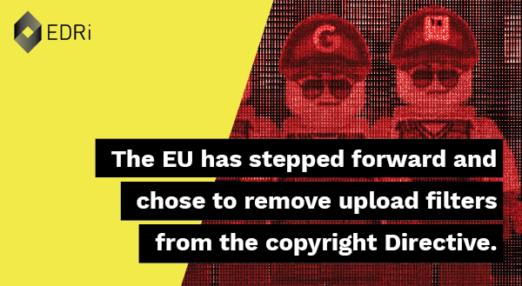
EU Parliament stands up against censorship machine
Today, on 26 March, the European Parliament voted against adopting the controversial upload filters as part of the copyright Directive text. This vote comes after what was an intense campaign for human rights activists, with millions of calls and emails from concerned individuals, as well as Europe-wide protests. XXX Members of the European Parliament adopted […]
Read more
-
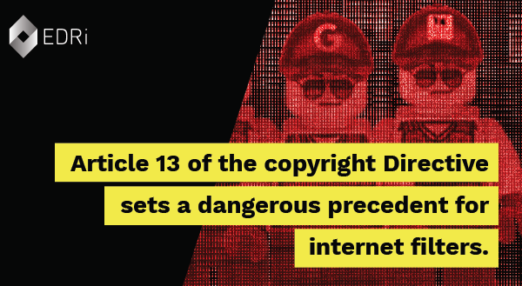
Press Release: Censorship machine takes over EU’s internet
Today, on 26 March, the European Parliament voted in favour of adopting controversial upload filters (Article 13/17) as part of the copyright Directive. This vote comes after what was an intense campaign for human rights activists, with millions of signatures, calls, tweets and emails from concerned individuals, as well as Europe-wide protests. Despite the mobilisation, […]
Read more
-

Join the ultimate Action Week against Article 13
The final vote on the Copyright Directive in the European Parliament plenary will take place on 26 March. A key piece raising concerns in the proposal is Article 13. It contains a change of platforms’ responsibility that will imminently lead to the implementation of upload filters on a vast number of internet platforms. The proposed […]
Read more
-

Open letter: Regulation on terrorist content online endangers freedom of expression
On 18 March 2019, together with seven other organisations, EDRi sent a letter to Members of the European Parliament (MEPs), to share our concerns with regards to the draft Regulation on preventing the dissemination of terrorist online content. The European Parliament Committee in Civil Liberties, Justice and Home Affairs (LIBE) is set to vote on […]
Read more
-

All you need to know about copyright and EDRi
The last vote on the Copyright Directive’s final text is set to take place on 26 March. Ahead of this crucial vote in the European Parliament plenary, here is some background on EDRi’s priorities around this topic.
Read more
-
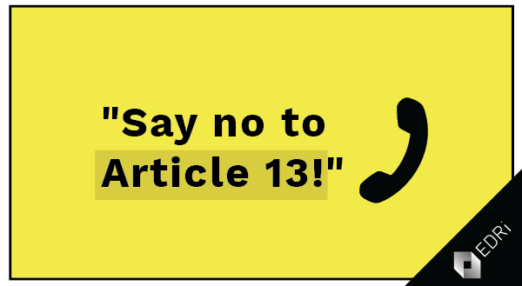
Record number of calls to the EU Parliament against upload filters
With just two weeks to go until the final vote on upload filters in the European Parliament, one hundred MEPs have pledged to vote against Article 13 of the proposed Copyright Directive. Many citizens feel like their legitimate fears about the future of the internet are not taken seriously as lawmakers insult them as being […]
Read more
-
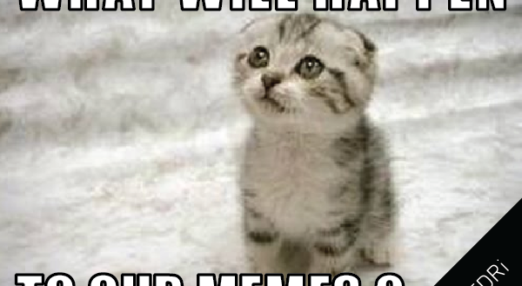
What will happen to our memes?
In Europe, new rules concerning copyright are being created that could change the internet fundamentally. The consequences that the upload filters included in the EU copyright Directive proposal will have for our creativity online raise concerns. Will everything we want to post to the internet have to pass through “censorship machines”? If the proposed Directive […]
Read more
-
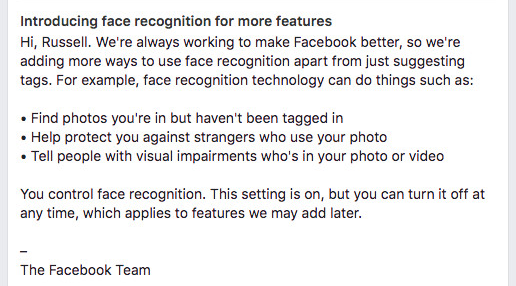
The art of dodging questions – Facebook’s privacy policies
Remember in April 2018, after the Cambridge Analytica scandal broke, we sent a series of 13 questions to Facebook about their users’ data exploitation policy. Months later, Facebook got back to us with answers. Here is a critical analysis of their response. Recognising people’s face without biometric data? The first questions (1a and 1b) related […]
Read more
-

FSFE: Publicly funded software has to result in public code
As the European Parliament elections approach, EDRi member Free Software Foundation Europe (FSFE) intensifies the efforts for the “Public Money? Public Code!” campaign. In January 2019, FSFE published a new brochure to serve as guidelines for decision-makers, explaining the fundamental benefits of public code. Free Software for a Free Society Free and Open Source Software […]
Read more
-

Women’s rights online: tips for a safer digital life
The internet is an incredible tool and has empowered women to speak up, react and organise to face patriarchy and oppression. But the internet is not a neutral place – sexist, racist, homophobic and other violent types of behaviour and content are disproportionately affecting women. This International Women’s Day, we would like to celebrate positive […]
Read more
-

Join us in the European Parliament to #SaveYourInternet!
After more than 3 years of debates, the decisive moment to ensure that upload filters are not imposed in the European Union (EU) has arrived. In the following weeks (date to be confirmed), the European Parliament (EP) will be voting on the copyright Directive. In its current form, article 13 of the copyright Directive would […]
Read more
-

EDRi calls on MEPs to not rush the vote on the copyright Directive
Today, it came to our attention that the copyright Directive could be voted as soon as next week, during the first Plenary session of the European Parliament. Such a short time-frame can only be explained as an attempt to avoid further debate and the participation of concerned citizens ahead of the vote. We cannot accept […]
Read more
